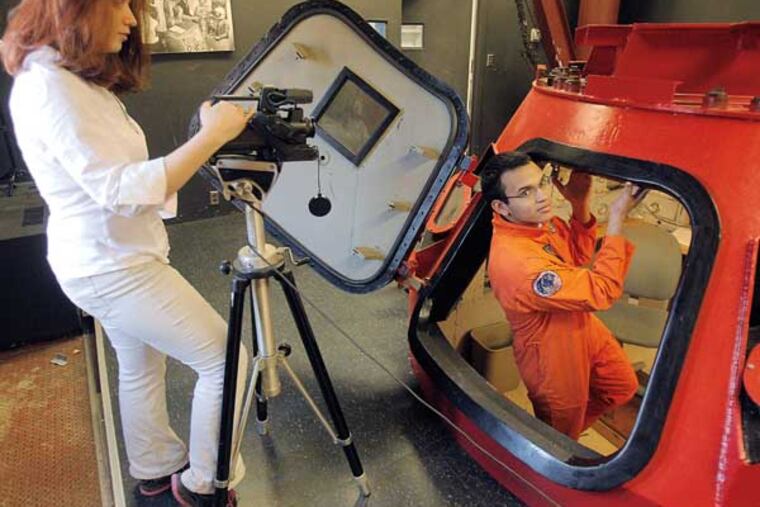Donations save Northeast High School's space program
Budget cuts scrubbed Northeast High School's acclaimed space research program. Supporters saved it. On Monday - just a few weeks after The Inquirer reported that the Philadelphia School District's budget crunch had killed the trailblazing, NASA-recognized program - it will resume operation.

Budget cuts scrubbed Northeast High School's acclaimed space research program. Supporters saved it.
On Monday - just a few weeks after The Inquirer reported that the Philadelphia School District's budget crunch had killed the trailblazing, NASA-recognized program - it will resume operation.
Alumni and friends of "SPARC," as the program is known, have funded it for the rest of the school year with plans to update outdated technology, find industry partnerships, and ensure its long-term survival. More than $13,000 has been raised.
It's not the first time Inquirer readers stepped up to save a district program this school year.
In the fall, an anonymous donor gave $205,000 to reopen libraries at Central High School and Masterman. A few days ago, readers donated more than $10,000 to ensure the city's flagship creative and performing arts high school can put on its annual musical.
Jeremy Cruz, a senior and one of the space program's managers, is thrilled that come spring he and the 119 other students in the program will embark on a two-day simulated space mission, the cherished capstone of the school year.
"We're all just so happy," he said. "We're so excited about the mission, and getting new technology."
Supporters' responses - and their donations - have been "unbelievable," said Christopher Frank, director of Northeast's magnet program. "I am amazed that it all came together so quickly."
SPARC operated with no money for the first part of the year, but when it became clear that no district funds would be forthcoming to keep the 50-year-old club afloat, school officials shut it down, along with all other academic extracurricular activities.
Word began seeping out the day before Christmas, when The Inquirer story appeared. A friend from the Class of 1977 alerted Burt Dicht to SPARC's plight, and Dicht, who has fund-raising experience, started a page for online donations.
"No one believed it," Dicht said.
Christopher Ferguson, a Philadelphia native and NASA astronaut, chipped in $100. Though he did not attend Northeast, he has served as honorary mission director in the past.
Ferguson had read the story during a visit home and "was astonished that such a forward-looking program like SPARC could be a victim of a budget ax. Wake up, America! It is through programs like this that dreams are made, young minds are filled with ambition, and the future begins to unfold."
Stanley Schwartz, a doctor who lives on the Main Line, gave $2,500. He was among the first SPARC students, a member of the Class of 1965.
The program looms large in his memory, especially the long bus tours to space centers in Houston, Florida, and Alabama with Robert Montgomery, the program's founder. SPARC gave Schwartz, the son of Holocaust survivors who grew up in a lower-middle-class home, an early taste of possibility.
"We got a really quality education and real opportunity," he said. "To interact with these other smart kids was something - we weren't the cheerleader, football-player type of people. We were the science geeks. SPARC made Northeast special, and we couldn't believe that they would get rid of something like this."
The program was important to Dicht, too. His experience as an astronaut in 1977 - "just an amazing experience, splashing down, heading into the control room with everyone cheering" - helped lead him to a career in engineering. Before becoming director of university programs for the Institute of Electrical and Electronics Engineers, Dicht worked as an engineer in the aerospace industry.
"SPARC," he said, "was such a great influence on me."
He and others want to ensure it continues to be a great influence on students from around the city, many of whom choose Northeast's magnet school because of the after-school space program.
At an initial meeting with school staff in January, Dicht and other alumni got assurances that the money they raised would go only to fund the space program. They cemented plans for an advisory committee, and got a sense of what the program needed going forward.
No significant investment has been made in the program since the mid-1990s, and the technology in place is badly outdated.
"What we have is very old and very expensive," Frank, the magnet-school director, said. "We haven't had technical expertise. We need people in the aerospace industry to really provide that up-to-date, modern experience."
The plan is to launch an annual campaign to bring alumni and friends together and to work with industry organizations in a serious way.
"We know it will take some effort, but everyone's committed to this," Dicht said.
The current SPARC crew is planning outreach - an open house for the community, and a well-planned mission in the spring - to remind people that the program is very much alive and relevant.
"We need to make a case for SPARC," Dicht said. "We really need to do things to keep this going."
215-854-5146 @newskag